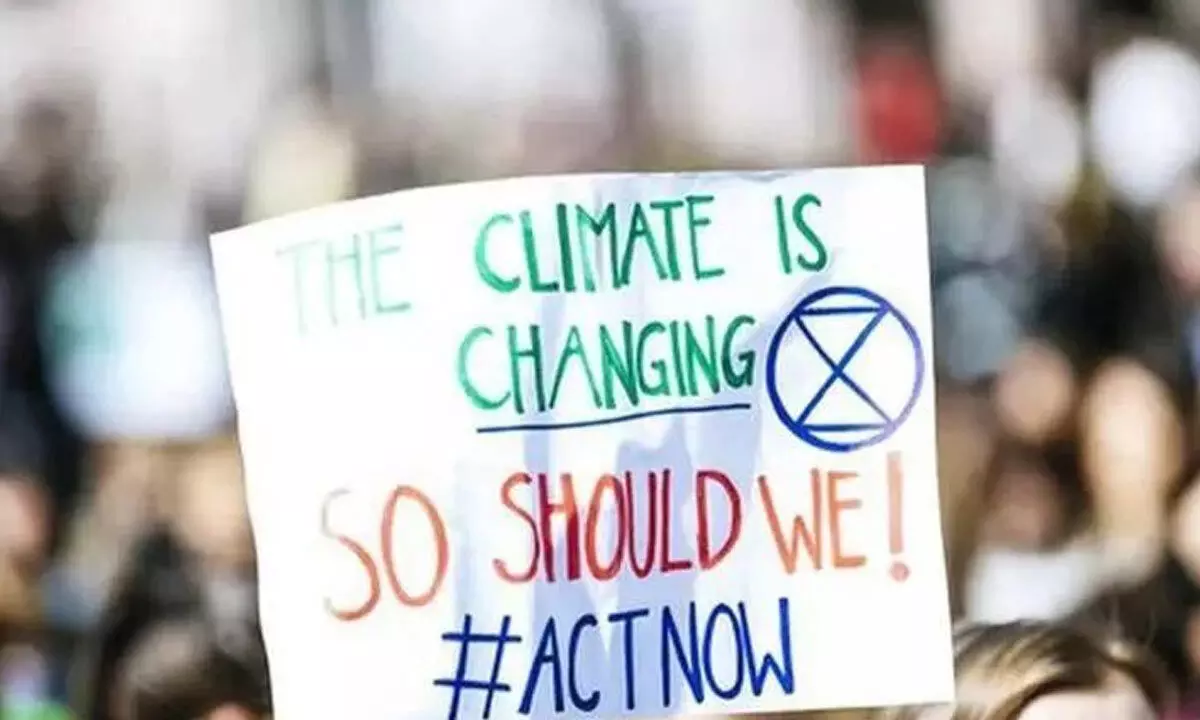Live
- Beacons of hope and love born on December 25
- Vajpayee’s legacy lives on as country marks his birth centenary
- Rythu Bharosa to pick best from PM -KISAN scheme
- Medak wears season’s festive look
- TG sets record in fine rice purchase
- Maintaining India’s growth momentum
- Study Reveals Teabags Release Billions of Microplastics and Nanoplastics, Entering Your Body
- Workplace Wonders: Creative Secret Santa Gifts for Colleagues
- Kumbh Mela 2025: Essential Guide to Comfortable and Respectful Attire for Maha Kumbh
- Hyderabad Real Estate Faces Setback: Property Sales Drop 7% Year-on-Year in 2024
Just In
A historic year for global climate policy


A historic year for global climate policy
In the past, climate action has been pushed to the back-burner when governments devise policy responses to global crises. But this year, amid Russia's war on Ukraine, spiralling inflation and energy shortages, tackling climate change has been central to recovery plans. It signals climate action and economic stability are no longer seen as competing priorities – instead, national governments realise they go hand-in-hand
Katherine Lake Melbourne: This year's global climate negotiations at the COP27 in Egypt were disappointing. In particular, the international commitment to limit planetary warming to 1.5 Degree Celsius remains on "life support." But hope is not lost.
In fact, 2022 was a historic year for international climate policy. It marked a shift in how the world's biggest greenhouse gas emitters – China, the United States, the European Union and India – deal with climate change when faced with economic and energy shocks. In the past, climate action has been pushed to the back-burner when governments devise policy responses to global crises. But this year, amid Russia's war on Ukraine, spiralling inflation and energy shortages, tackling climate change has been central to recovery plans. It signals climate action and economic stability are no longer seen as competing priorities – instead, national governments realise they go hand-in-hand. As European Commission President Ursula von der Leyen has noted, this represents a major turning point in global climate policy and a "leap into the future."
A global turning point
Russia's illegal war on Ukraine has destabilised the global energy market and caused sharp rises in food and commodity prices, worsening global inflation. In the past, such shocks would have prompted governments to enact a fairly blinkered policy response. During the 1970s global oil crisis, for example, governments brought in massive fossil fuel subsidies and eased environmental rules for the petroleum industry, rather than reduce oil dependency. In the aftermath of the global financial crisis in 2008, government responses were often similarly short-sighted. Low-interest loans to banks and other institutions, for example, perpetuated a business-as-usual economic system of high emissions. This was coupled with years of austerity which derailed funding and investment for climate action.
Hearteningly, 2022 has seen a very different approach. The United States, European Union, China and India have all prioritised climate change in their response to global economic crises, as I outline below. Why? Public support for climate action is ever-growing and climate-related disasters are becoming worse. What's more, renewable energy costs continue to fall, and energy security and global competitiveness remain big concerns.
EU & US step up
In the immediate aftermath of Russia's invasion of Ukraine, the EU made a "dash for gas" to replace Russian supply. Its RePowerEU plan, released in May, presents clean energy as the solution to the so-called energy trilemma of costs, security and environmental sustainability. Among other measures, the plan involves: ramped-up targets for renewable energy and energy efficiency; substantial home and business electrification measures including electric vehicles and heat pumps; ambitious targets for green hydrogen; eliminate reliance on Russian gas by 2027 and almost halve overall gas use by 2030.
The US took similar action this year. Its historic Inflation Reduction Act puts clean energy investment at the forefront of plans to address the cost-of-living crisis. At least $369 billion will be spent on clean energy initiatives to reduce energy bills. By aligning climate change with economic policy, the government has shifted the business narrative from risk to opportunity. This month the Biden administration went further, with a proposal for major government suppliers to disclose greenhouse gas emissions and set science-based emissions reduction targets.
Progress in China, India
China's government in July the government released an emissions reduction blueprint for urbanisation and rural development. It includes ambitious measures to increase the energy efficiency of buildings, electrify buildings and transport (including huge deployment of electric vehicle charging stations) and mandate rooftop solar on new factories and public buildings.
In India, a National Electricity Plan released by the central government this year has clean energy at its core. It means renewables capacity is set to soar by 250 per cent over the next decade. India's government has also introduced policies to favour electrification in buildings and transport – a departure from a previous policy in which gas played a significant role in future energy supply.
Change is afoot
Analysis suggests the systemic changes outlined above could mean the EU, China and India exceed their current commitments under the Paris Agreement. This is good news – but the world still has a long way to go. Australia still lags behind other comparable nations. But recent developments in the EU and US offer lessons on the way forward.
(The Conversation)

© 2024 Hyderabad Media House Limited/The Hans India. All rights reserved. Powered by hocalwire.com






